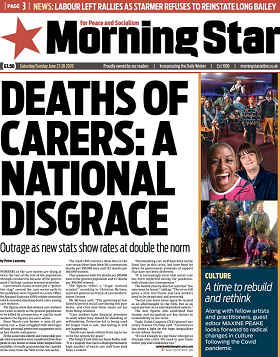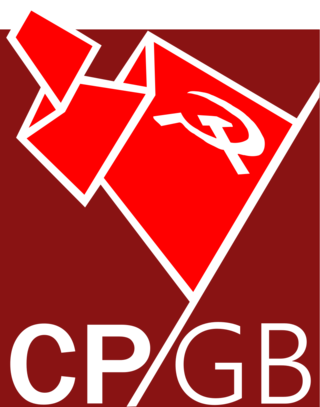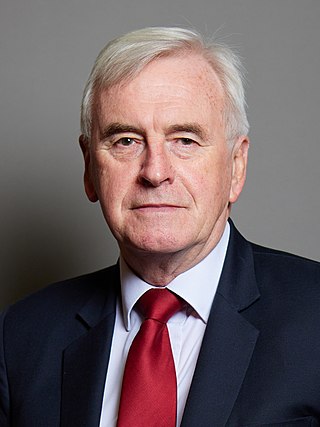Related Research Articles

The Independent Labour Party (ILP) was a British political party of the left, established in 1893 at a conference in Bradford, after local and national dissatisfaction with the Liberals' apparent reluctance to endorse working-class candidates, representing the interests of the majority. A sitting independent MP and prominent union organiser, Keir Hardie, became its first chairman.

The Morning Star is a left-wing British daily newspaper with a focus on social, political and trade union issues. Originally founded in 1930 as the Daily Worker by the Communist Party of Great Britain (CPGB), ownership was transferred from the CPGB to an independent readers' co-operative, the People's Press Printing Society, in 1945 and later renamed the Morning Star in 1966. The paper describes its editorial stance as in line with Britain's Road to Socialism, the programme of the Communist Party of Britain.

The Scottish Trades Union Congress (STUC) is the national trade union centre in Scotland. With 40 affiliated unions as of 2020, the STUC represents over 540,000 trade unionists.

The Communist Party of Great Britain is a political group which publishes the Weekly Worker newspaper. The CPGB (PCC) claims to have "an internationalist duty to uphold the principle, 'One state, one party'. To the extent that the European Union becomes a state then that necessitates EU-wide trade unions and a Communist Party of the EU". In addition, it is in favour of the unification of the entire working class under a new Communist International. It is not to be confused with the former Communist Party of Great Britain, the Communist Party of Great Britain (Marxist–Leninist), or the current Communist Party of Britain.

John Martin McDonnell is a British politician who served as Shadow Chancellor of the Exchequer from 2015 to 2020. A member of the Labour Party, he has been Member of Parliament (MP) for Hayes and Harlington since 1997.

The National Union of Rail, Maritime and Transport Workers is a British trade union covering the transport sector. Its current President is Alex Gordon and its current General Secretary is Mick Lynch.

Harpal Brar is an Indian communist politician, writer and businessman, based in the United Kingdom. He is the founder and former chairman of the Communist Party of Great Britain (Marxist–Leninist), a role from which he stood down in 2018.
The Campaign For A New Workers' Party was an initiative of the Socialist Party of England and Wales that argued for the establishment of a new mass workers' party, involving trade union activists, socialists, anti-capitalists, anti-war and environmental activists. It was launched at the party's annual Socialism event in November 2005. There were more than 4,000 signatories to the campaign's founding declaration, many of whom were trade unionists. Some left parties claimed that the CNWP was a front for the Socialist Party.
The Labour Representation Committee (LRC) is a British socialist pressure group within the Labour Party and wider labour movement. It is often seen as representing the most left-wing members of the Labour Party.
The British left can refer to multiple concepts. It is sometimes used a shorthand for groups aligned with the Labour Party. It can also refer to other individuals, groups and political parties that have sought egalitarian changes in the economic, political, and cultural institutions of the United Kingdom. Various subgroups with a national scope are active. Liberals and progressives believe that equality can be accommodated into existing capitalist structures, but they differ in their criticism of capitalism and on the extent of reform and the welfare state. Anarchists, communists, socialists, and social democrats, among others, with international imperatives are also present within this macro-movement.
The Convention of the Left (CL) is an annual conference of British left, socialist, progressive and green parties and organisations, first held in Manchester in September 2008. The format of the conference was that it 'shadowed' the Labour Party's 2008 Annual Conference, also being held in the city. A 'recall' event was held in the city in January 2009.

Trade Unionist and Socialist Coalition (TUSC) is a socialist electoral alliance in Britain. It was originally launched for the 2010 general election.
The Organisation of Scottish Labour is a body established under the national rules of the UK Labour Party.

The Trades Union Congress (TUC) is a national trade union centre, a federation of trade unions in England and Wales, representing the majority of trade unions. There are 48 affiliated unions, with a total of about 5.5 million members. Paul Nowak is the TUC's current General Secretary, serving from January 2023.

The Communist Party of Britain (CPB) is a communist party in Great Britain which emerged from a dispute between Eurocommunists and Marxist-Leninists in the Communist Party of Great Britain in 1988. It follows Marxist-Leninist theory and supports what it regards as existing socialist states, and has fraternal relationships with the ruling parties in Cuba, China, Laos, and Vietnam. It is affiliated nationally to the Cuba Solidarity Campaign and the Venezuela Solidarity Campaign. It is a member of the International Meeting of Communist and Workers' Parties, together with 117 other political parties. After the fall of the Soviet Union, the party was one of two original British signatories to the Pyongyang Declaration.

Socialism in the United Kingdom is thought to stretch back to the 19th century from roots arising in the aftermath of the English Civil War. Notions of socialism in Great Britain have taken many different forms from the utopian philanthropism of Robert Owen through to the reformist electoral project enshrined in the birth of the Labour Party that was founded in 1900.

The Socialist Party is a Trotskyist political party in England and Wales. Founded in 1997, it had formerly been Militant, an entryist group in the Labour Party from 1964 to 1991, which became Militant Labour from 1991 until 1997.
The Socialist Workers Party (SWP) is a far-left political party in the United Kingdom. Founded as the Socialist Review Group by supporters of Tony Cliff in 1950, it became the International Socialists in 1962 and the SWP in 1977. The party considers itself to be Trotskyist. Cliff and his followers criticised the Soviet Union and its satellites, calling them state capitalist rather than socialist countries.
References
- 1 2 Richards, Andy (26 May 2010). "A people's alternative". Morning Star . Archived from the original on 11 May 2012. Retrieved 24 June 2010.
- ↑ The People's Charter for a fairer Scotland (PDF). Scottish Organising Committee for the People's Charter. 2009. Archived from the original (PDF) on 29 November 2016. Retrieved 28 November 2016.
- ↑ "Congress Decisions 2009, Resolutions Carried: 32 People's Charter". Trades Union Congress. Archived from the original on 14 December 2010. Retrieved 24 June 2010.
- ↑ The People's Charter a charter for change (PDF). Plymouth TUC. 2009. Archived from the original (PDF) on 26 May 2018. Retrieved 28 November 2016.
- ↑ "People's Charter - getting organised locally". communist-party.org.uk. Communist Party of Britain. 13 February 2010.
- ↑ "People's Charter Convention - Sat 21 Nov". l-r-c.org.uk. Labour Representation Committee. 20 November 2009. Archived from the original on 3 March 2012. Retrieved 25 June 2010.
- ↑ Campaign for Socialism Exec (23 February 2009). "Launch of Scottish Labour Representation Committee and People's Charter". www.thecitizen.org.uk. Archived from the original on 16 February 2012.
- ↑ Sell, Hannah (26 November 2009). "Is the People's Charter a step towards workers' political representation?". socialistpartyscotland.org.uk. Socialist Party Scotland. Archived from the original on 26 May 2018. Retrieved 26 May 2018.
- ↑ Saddiq, Amina (21 February 2009). "The problem with the "People's Charter"". workersliberty.org. Workers' Liberty . Retrieved 24 June 2010.